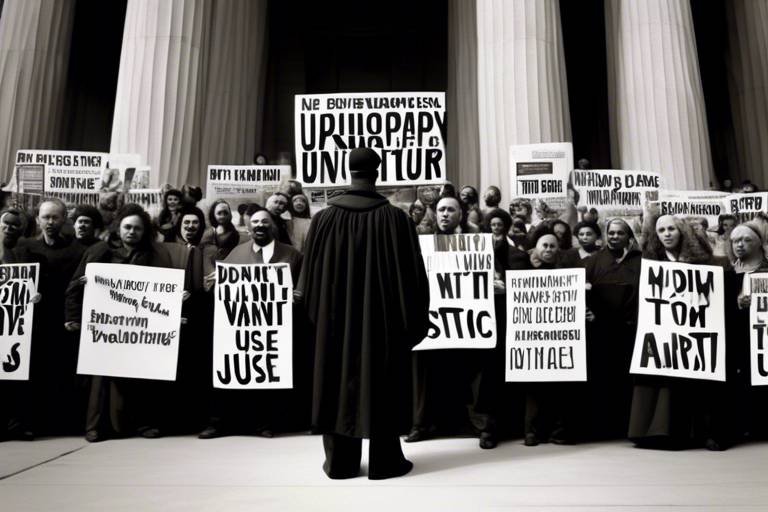Ancient Philosophic Ideas in Modern Political Systems
Throughout history, the interplay between ancient philosophical ideas and modern political systems has created a rich tapestry of governance, ethics, and societal norms. It is fascinating to observe how concepts that originated thousands of years ago continue to shape our contemporary political landscapes. These ancient philosophies are not merely relics of the past; they are living ideas that resonate through the corridors of power today. From the democratic ideals of ancient Greece to the moral frameworks of Confucianism, the echoes of these philosophies can be seen influencing political thought and action in various cultures and ideologies.
Consider this: what if the principles that guided the great thinkers of antiquity could provide solutions to the pressing issues we face today? This exploration aims to uncover the profound connections between ancient wisdom and modern governance, illustrating how the foundational ideas of philosophers like Plato, Aristotle, and Confucius continue to guide leaders and shape policies. As we delve deeper, we will discover that these ancient ideas are not just historical footnotes but essential components of our political discourse, ethics, and the very fabric of society.
In our journey, we will examine how the emphasis on reason and ethics in leadership, as articulated by Greek philosophers, has found a place in the hearts and minds of today's political leaders. We will also explore the Roman contributions, which introduced structured governance and civic duty, underscoring the importance of citizen participation in democracy. Moreover, we will touch upon Stoicism's emphasis on virtue and moral integrity, which remains relevant as modern leaders navigate the complexities of governance.
Furthermore, we cannot overlook the influence of Epicureanism, which advocates for the pursuit of happiness and the social contract, shaping contemporary views on individual rights and government responsibilities. As we transition to Eastern philosophies, we will see how Confucian principles of harmony and moral leadership continue to influence political systems, particularly in East Asia, stressing the importance of ethical governance and social order.
Ultimately, this exploration will reveal that ancient philosophic ideas are not confined to dusty books in libraries; they are vibrant and dynamic, breathing life into modern political systems. They challenge us to reflect on our values, our governance, and our responsibilities as citizens. The synthesis of these ancient ideas with contemporary political practices invites us to consider how we can cultivate a more just and equitable society, one that honors the wisdom of the past while boldly facing the challenges of the future.
- How do ancient philosophies influence modern political systems?
Ancient philosophies provide foundational concepts such as democracy, justice, and ethics, which continue to shape contemporary political thought and governance structures. - What role does Stoicism play in today's leadership?
Stoicism emphasizes virtue and moral integrity, encouraging leaders to prioritize ethical governance and responsible decision-making in the face of challenges. - Are there any modern political systems that directly reflect Confucian ideals?
Yes, many East Asian political systems incorporate Confucian principles, emphasizing harmony, respect for authority, and merit-based leadership. - How does utilitarianism impact policy-making today?
Utilitarianism advocates for the greatest good for the greatest number, influencing modern policies to prioritize outcomes that benefit the majority while addressing ethical dilemmas.

Influence of Greek Philosophy
Greek philosophy has profoundly shaped the way we understand governance, ethics, and the very fabric of society. Think about it: the ideas of ancient thinkers like Plato and Aristotle are not just relics of the past; they are the bedrock upon which many modern political systems stand. These philosophers introduced concepts that resonate deeply with our contemporary values, particularly the notions of democracy, justice, and ethical leadership.
For instance, Plato's vision of a "philosopher-king" emphasizes that true leaders should be wise and virtuous. This idea suggests that governance should not merely be about power but also about moral integrity and the pursuit of the common good. In today's world, where political scandals often dominate the headlines, Plato's ideals remind us of the importance of ethics in leadership. Aristotle, too, contributed significantly by advocating for a balanced government that includes elements of democracy, oligarchy, and monarchy. He believed that a mixed constitution could prevent the tyranny of the majority and ensure that all voices are heard. This idea is reflected in modern democratic frameworks where checks and balances are essential to maintaining order and fairness.
Moreover, Greek philosophy also laid the groundwork for the concept of citizenship. In ancient Athens, being a citizen came with rights and responsibilities, a notion that continues to influence our understanding of civic duty today. Citizens are not just passive observers; they are active participants in the political process. This idea is particularly relevant in contemporary discussions about voter engagement and the importance of public participation in governance. As we navigate complex political landscapes, the call to be informed and involved echoes the teachings of these ancient philosophers.
Interestingly, the influence of Greek thought extends beyond the Western world. Many cultures have integrated these philosophical ideas into their governance models, adapting them to fit their unique societal contexts. For example, the emphasis on rational discourse and debate in Greek philosophy can be seen in various political systems that value civil discourse and the exchange of ideas. This philosophical heritage encourages us to engage in discussions that transcend emotional rhetoric, fostering a political culture grounded in reason and respect.
| Philosopher | Key Contribution | Modern Relevance |
|---|---|---|
| Plato | Philosopher-King | Ethical leadership and governance |
| Aristotle | Mixed Constitution | Checks and balances in democracy |
In summary, the influence of Greek philosophy on modern political systems is undeniable. These ancient ideas continue to inspire leaders and citizens alike, reminding us that the pursuit of justice, ethical governance, and active citizenship are timeless values. As we reflect on our political landscape, we must recognize the profound legacy of these thinkers and consider how their teachings can guide us toward a more just and equitable society.

Roman Contributions to Governance
The Roman Republic, a beacon of political innovation, introduced a plethora of ideas that have profoundly shaped modern governance. At the heart of these contributions lies the concept of checks and balances. This system was designed to prevent any single branch of government from becoming too powerful, ensuring a balance that is crucial in today's democracies. Imagine a three-legged stool; if one leg is too long, the entire structure becomes unstable. Similarly, the Roman approach aimed to create a stable governance structure where power is distributed and regulated.
Another significant Roman contribution is the notion of civic duty. Romans believed that citizens had a responsibility to participate in their government, which is evident in practices like voting and public service. This idea is not merely historical; it resonates in contemporary discussions about civic engagement. In fact, many modern democracies emphasize the importance of active participation, encouraging citizens to voice their opinions and contribute to the political process. Without this engagement, the very foundation of democracy could crumble.
Moreover, the Romans pioneered the development of a legal system that emphasized the rule of law over the whims of individuals. This principle is encapsulated in the phrase “Dura lex, sed lex”, meaning “The law is harsh, but it is the law.” This idea underscores the importance of a structured legal framework that protects individuals and maintains order within society. Today, we see this reflected in various legal systems around the world that strive to uphold justice and fairness.
To illustrate the impact of these Roman contributions, consider the following table that highlights key elements of Roman governance and their modern equivalents:
| Roman Concept | Modern Equivalent |
|---|---|
| Checks and Balances | Separation of Powers |
| Civic Duty | Active Citizenship |
| Rule of Law | Legal Frameworks |
| Public Service | Government Accountability |
These principles not only laid the groundwork for modern political systems but also continue to inspire discussions about governance today. As we navigate the complexities of contemporary politics, reflecting on these ancient Roman ideas can provide valuable insights. The enduring legacy of Roman contributions serves as a reminder that the foundations of our political structures are deeply rooted in history, and understanding this lineage can empower us to better engage with our current systems.

Stoicism and Political Ethics
Stoicism, an ancient Greek philosophy, places a significant emphasis on virtue and moral integrity. This philosophical framework has profoundly influenced modern political ethics, encouraging leaders to prioritize ethical governance and responsibility in their decision-making processes. In a world where political scandals and ethical dilemmas seem to dominate the headlines, the teachings of Stoicism remind us that the character of a leader is paramount. Just as a ship needs a skilled captain to navigate through turbulent waters, a society thrives under leaders who embody moral fortitude.
At its core, Stoicism teaches that virtue—defined as wisdom, courage, justice, and temperance—is the only true good. This perspective challenges modern politicians to reflect on their values and the impact of their actions on society. For instance, when leaders make decisions that prioritize personal gain over the common good, they stray from Stoic ideals, which advocate for selflessness and the welfare of the community. This philosophical lens encourages politicians to ask themselves: Are my actions contributing to the greater good?
Moreover, Stoicism's focus on rationality and self-control plays a vital role in political ethics. In the heat of political debates and the pressure of public opinion, it's easy for leaders to succumb to emotional responses. However, Stoic teachings advocate for a calm and rational approach, allowing leaders to navigate challenges with clarity and composure. This is especially relevant in today’s fast-paced political landscape, where decisions can have far-reaching consequences. By practicing Stoic principles, leaders can cultivate resilience, enabling them to withstand criticism and remain steadfast in their commitment to ethical governance.
In addition, Stoicism fosters a culture of respectful dialogue and understanding, which is crucial for healthy political discourse. It encourages leaders and citizens alike to engage in discussions that are rooted in reason rather than emotion. This approach can transform the political arena from a battleground of insults and accusations into a forum for constructive debate. When individuals prioritize respect and rationality, they can work towards common goals, bridging divides that often seem insurmountable. After all, isn't progress rooted in understanding?
To further illustrate the impact of Stoicism on political ethics, consider the following table that outlines key Stoic principles and their relevance in modern governance:
| Stoic Principle | Modern Application |
|---|---|
| Virtue as the Highest Good | Encourages ethical leadership and decision-making. |
| Rational Decision-Making | Promotes calm and thoughtful responses to crises. |
| Emphasis on Community | Fosters policies that prioritize the welfare of all citizens. |
| Self-Control | Helps leaders resist the temptation of power and corruption. |
In conclusion, the influence of Stoicism on political ethics cannot be overstated. As we navigate the complexities of modern governance, the principles of Stoicism serve as a guiding light, urging leaders to act with integrity, engage in respectful discourse, and prioritize the common good. By embracing these ancient teachings, contemporary political figures can cultivate a political culture that values ethics over expediency, ultimately leading to a more just and harmonious society.
- What is Stoicism? Stoicism is an ancient Greek philosophy that emphasizes virtue, self-control, and rationality.
- How does Stoicism influence modern politics? Stoicism encourages ethical governance, rational decision-making, and respectful discourse among leaders and citizens.
- Why is ethical leadership important? Ethical leadership fosters trust, accountability, and a commitment to the common good, which are vital for a healthy democracy.
- Can Stoicism help in crisis management? Yes, Stoic principles promote resilience and rationality, essential qualities for leaders facing challenges.

Stoicism in Leadership
In today's fast-paced political landscape, where challenges can arise at any moment, Stoicism offers a remarkable framework for leaders striving to maintain their composure and effectiveness. Imagine navigating a stormy sea without losing your sense of direction—that's what Stoic principles can do for modern leaders. By embracing the teachings of ancient Stoics like Seneca and Marcus Aurelius, leaders can cultivate a mindset that values rationality, self-control, and ethical decision-making.
One of the core tenets of Stoicism is the idea of focusing on what is within our control. Leaders often face a barrage of external pressures, from public opinion to unexpected crises, which can lead to anxiety and rash decisions. However, a Stoic leader understands that while they cannot control external events, they can control their reactions and decisions. This perspective fosters resilience, allowing leaders to remain grounded and make thoughtful choices even in turbulent times.
Furthermore, Stoicism encourages leaders to practice virtue and integrity. In a world where political scandals and ethical dilemmas frequently make headlines, the Stoic emphasis on moral character serves as a beacon. Leaders who embody Stoic virtues—such as wisdom, courage, and justice—are more likely to inspire trust and loyalty among their constituents. This is crucial because a leader's credibility can significantly impact their ability to govern effectively.
Moreover, Stoicism teaches the importance of empathy and understanding. A Stoic leader recognizes that every decision affects a multitude of lives. By adopting a compassionate approach, they can engage with their communities more meaningfully. This not only enhances public relations but also fosters a sense of belonging and collective purpose among citizens. When leaders engage with their constituents on a human level, they create a political culture that values collaboration over division.
In summary, Stoicism equips modern leaders with essential tools to navigate the complexities of governance. By prioritizing rational decision-making, ethical integrity, and empathetic engagement, Stoic leaders can rise above the chaos of politics and guide their communities toward a more harmonious future. In essence, Stoicism is not just a philosophy; it is a practical guide for effective leadership in the contemporary world.
- What is Stoicism?
Stoicism is an ancient Greek philosophy that teaches the development of self-control and fortitude as a means to overcome destructive emotions. It emphasizes rationality and virtue as the path to a good life.
- How can Stoicism benefit leaders?
Stoicism helps leaders maintain composure in stressful situations, make ethical decisions based on virtue, and engage empathetically with their communities.
- Is Stoicism relevant in modern politics?
Absolutely! Stoicism provides timeless principles that can guide leaders in navigating the complexities and ethical dilemmas of contemporary governance.

Impact on Civil Discourse
In today's fast-paced political landscape, civil discourse seems to be a rare commodity. However, the ancient philosophy of Stoicism offers a refreshing perspective that emphasizes the importance of respectful dialogue and understanding. Imagine a world where political discussions are driven not by anger or division, but by reasoned debate and mutual respect. This is the essence of Stoic influence on civil discourse.
Stoicism teaches us that emotions can cloud our judgment, leading to hasty conclusions and entrenched positions. Instead, Stoic philosophers like Epictetus and Marcus Aurelius encourage individuals to rise above their passions and engage in discussions with a rational mindset. This approach not only fosters a more productive political environment but also cultivates a culture where differing opinions can coexist peacefully.
To illustrate this point, consider the following aspects of Stoicism that impact civil discourse:
- Emphasis on Rationality: Stoicism advocates for a reasoned approach to discussions, encouraging individuals to focus on facts rather than emotions.
- Respect for Opponents: Stoics believe in acknowledging the validity of others' perspectives, which can lead to more constructive conversations.
- Self-Control: By practicing self-restraint, individuals can avoid inflammatory rhetoric that often derails civil discussions.
By promoting these Stoic principles, we can create a political culture that values reasoned debate over emotional rhetoric. This shift is crucial, especially in an era where social media amplifies divisive voices and often drowns out thoughtful discourse. Imagine if politicians and citizens alike embraced Stoic teachings, prioritizing understanding and respect in their interactions. The potential for collaboration and progress would be immense.
Moreover, the Stoic approach to civil discourse encourages individuals to engage in active listening. This means genuinely hearing what others have to say, rather than merely waiting for a chance to respond. When we listen actively, we open the door to deeper understanding and, ultimately, more effective problem-solving. It’s about building bridges instead of walls, fostering a sense of community in political discussions.
In conclusion, the impact of Stoicism on civil discourse is profound. By embracing its principles, we can transform our political conversations into opportunities for growth and understanding. In a world where division often reigns, Stoicism offers a pathway to a more harmonious and productive political landscape.
- What is Stoicism? Stoicism is an ancient Greek philosophy that teaches the development of self-control and fortitude as a means to overcome destructive emotions.
- How can Stoicism improve civil discourse? By emphasizing rationality, respect for others, and self-control, Stoicism encourages more constructive and respectful political discussions.
- Are there modern examples of Stoicism in politics? Yes, many leaders draw upon Stoic principles to guide their decision-making and public interactions, promoting a culture of reasoned debate.

Epicureanism and Social Contract
Epicureanism, founded by the ancient Greek philosopher Epicurus, is often misunderstood as merely a pursuit of pleasure. However, at its core, it advocates for a thoughtful and balanced approach to happiness, emphasizing the importance of friendship, community, and the social contract. This philosophical framework suggests that individuals thrive not in isolation but within a society that promotes well-being and mutual respect. The social contract, a concept that has evolved over centuries, aligns closely with Epicurean thought by positing that individuals consent to form societies for the protection of their rights and the promotion of their happiness.
In a modern context, Epicureanism encourages us to consider how our governments can create an environment where individuals can pursue their happiness without infringing on the rights of others. This leads to a more profound understanding of governance as not just a mechanism of control but as a facilitator of well-being. The role of government, then, becomes one of ensuring that the social contract is honored, providing the necessary structures and support for individuals to flourish. This involves not only protecting individual rights but also promoting social policies that enhance the quality of life for all citizens.
Imagine a society where the government actively encourages not just economic growth but also the holistic well-being of its citizens. Here are some key aspects where Epicureanism intersects with the social contract in modern governance:
- Promotion of Individual Rights: Epicureanism supports the idea that individuals should have the freedom to pursue their own happiness, provided they do not harm others. This aligns perfectly with the fundamental principles of the social contract, where the protection of individual rights is paramount.
- Community Well-being: The Epicurean emphasis on community and friendship highlights the importance of social bonds in achieving happiness. Governments can foster this by creating policies that promote social interaction, community services, and public spaces.
- Ethical Governance: A government that embodies Epicurean principles would prioritize ethical decision-making, ensuring that policies are designed not only for economic efficiency but also for the overall happiness of its citizens.
In essence, Epicureanism and the social contract together create a framework for understanding modern governance. They remind us that the ultimate goal of any political system should be to enhance the well-being of its citizens. By recognizing the interconnectedness of individual happiness and societal health, we can advocate for a political landscape that genuinely reflects these values. As we navigate the complexities of contemporary governance, it is crucial to keep in mind that a society that values the happiness of its members is one that is likely to flourish.
- What is Epicureanism? Epicureanism is a philosophical system that emphasizes the pursuit of happiness through the cultivation of friendships, the enjoyment of simple pleasures, and the avoidance of pain.
- How does Epicureanism relate to the social contract? Epicureanism advocates for a social structure that promotes individual happiness, aligning with the social contract's focus on protecting rights and fostering community well-being.
- Can Epicurean principles influence modern governance? Yes, Epicurean principles can guide policymakers to create environments that prioritize the happiness and well-being of citizens, ensuring ethical governance and community support.

Confucianism's Role in Governance
Confucianism, an ancient philosophical system founded by Confucius, has profoundly shaped governance, especially in East Asia. Its core tenets emphasize harmony, respect for authority, and the importance of moral leadership. These principles are not merely relics of the past; they continue to resonate in modern political systems, influencing how societies view authority and ethical governance. In a world often marred by political discord, the Confucian emphasis on harmony offers a refreshing perspective, encouraging leaders to foster unity and social stability.
One of the most significant contributions of Confucianism to governance is the idea of ethical leadership. Confucius believed that rulers should embody virtue and moral integrity, setting an example for their citizens. This concept is crucial today, as societies increasingly demand accountability and ethical behavior from their leaders. The expectation that leaders must possess both competence and moral character is a legacy of Confucian thought that remains relevant in contemporary political appointments.
Moreover, Confucianism promotes a meritocratic system in governance. This approach encourages the selection of leaders based on their abilities and virtues rather than their social status or connections. In practical terms, this means that governments should prioritize competence in leadership positions, which can lead to more effective and just governance. In many East Asian countries, civil service exams inspired by Confucian ideals still play a vital role in ensuring that the most qualified individuals hold public office.
Another pivotal aspect of Confucianism is its focus on community and family values. Confucius emphasized the importance of familial ties and social cohesion, which are essential for maintaining order and stability within society. This focus on community extends to governance, where policies often reflect the need for collective responsibility. For instance, many modern governments implement social programs aimed at strengthening family units and fostering community engagement, recognizing that a stable society is built on strong interpersonal relationships.
In summary, Confucianism's role in governance is multifaceted, intertwining ethical leadership, meritocracy, and community values. As we navigate the complexities of modern political landscapes, the wisdom of Confucian thought offers valuable insights into fostering a more harmonious and effective governance structure. By embracing these ancient principles, contemporary political systems can strive for a balance between authority and ethical responsibility, ultimately leading to a more stable and cohesive society.
- What are the core principles of Confucianism?
Confucianism emphasizes harmony, respect for authority, ethical leadership, and the importance of community and family values. - How does Confucianism influence modern governance?
It encourages ethical leadership, meritocracy, and policies that foster social cohesion and collective responsibility. - Is Confucianism relevant today?
Yes, its teachings on moral integrity and community values continue to resonate in contemporary political systems, particularly in East Asia.

Meritocracy and Leadership
In the realm of governance, the concept of meritocracy stands as a beacon of hope for many, particularly in the context of Confucianism. This ancient philosophy advocates for a system where leaders are chosen based on their abilities and moral integrity rather than their social status or connections. Imagine a world where your skills and virtues are the only tickets to leadership; that’s the essence of meritocracy! It’s a refreshing concept that resonates deeply in today’s political landscape, where citizens increasingly demand competent and ethical governance.
Confucian thought emphasizes that a leader should embody the qualities of wisdom, integrity, and compassion. This idea is not just an idealistic notion; it has practical implications for how governments operate. In many East Asian countries, for instance, the recruitment process for civil servants often involves rigorous examinations that test both knowledge and ethical reasoning. This approach not only helps in selecting qualified individuals but also promotes a culture of accountability and responsibility among leaders.
Furthermore, the meritocratic system encourages a sense of fairness and transparency in governance. When citizens see that leadership positions are filled based on merit, they are more likely to trust their government and engage in civic activities. This trust is essential for social cohesion and stability. In contrast, when leadership is based on favoritism or nepotism, it breeds disillusionment and can lead to social unrest.
To illustrate the impact of meritocracy in leadership, consider the following table that compares meritocratic and non-meritocratic systems:
| Aspect | Meritocratic System | Non-Meritocratic System |
|---|---|---|
| Selection Criteria | Skills and Ethics | Connections and Status |
| Public Trust | High | Low |
| Accountability | High | Low |
| Social Stability | Enhanced | Threatened |
In conclusion, the principles of meritocracy rooted in Confucianism offer a framework for selecting leaders who are not only capable but also morally upright. This approach not only improves governance but also nurtures a political culture where everyone feels they have a fair chance to contribute to society. The challenge, however, lies in implementing these ideals in a world where entrenched interests often resist change. But as history shows us, the pursuit of meritocracy is a journey worth taking, one that can lead to a more just and equitable society.
- What is meritocracy? Meritocracy is a system of governance where individuals are selected for leadership roles based on their abilities and achievements rather than their social status or connections.
- How does Confucianism influence modern governance? Confucianism promotes the idea that leaders should be chosen for their moral integrity and competence, which has led to merit-based recruitment practices in many political systems.
- Why is public trust important in governance? Public trust is crucial for social cohesion and stability; when citizens trust their leaders, they are more likely to engage in civic activities and support government initiatives.
- What are the challenges of implementing meritocracy? The main challenges include overcoming entrenched interests and resistance to change, as well as ensuring fair assessment processes that genuinely reflect an individual's capabilities.

Community and Family Values
At the heart of Confucianism lies a profound respect for community and family values, which are not merely social constructs but essential elements that shape the fabric of society. In many East Asian cultures, these values are woven into the daily lives of individuals, influencing everything from personal relationships to governance. Imagine a tree, with its roots firmly planted in the ground; the roots symbolize family, while the branches represent the wider community. Just as a tree thrives when its roots are strong, so too does a society flourish when its community and family structures are robust.
In practical terms, this means that policies reflecting community and family values are crucial for fostering social cohesion. Governments that prioritize these values often see a more engaged citizenry, where individuals feel a sense of belonging and responsibility towards one another. For instance, community programs that support family units—such as parental leave policies, affordable childcare, and elder care—are vital in nurturing strong familial ties. When families are supported, the entire community benefits, creating a ripple effect of positive outcomes.
Moreover, Confucian thought emphasizes the importance of filial piety, which is the respect and duty that children owe to their parents and ancestors. This concept not only strengthens family bonds but also cultivates a sense of responsibility among individuals to contribute positively to their communities. It’s like a cycle of care—when individuals honor their families, they are more likely to extend that respect and responsibility to their neighbors and community members. This interconnectedness fosters a culture where people look out for one another, creating a safety net that is vital in times of crisis.
To illustrate the impact of community and family values on governance, consider the following table that outlines key aspects:
| Aspect | Impact on Governance |
|---|---|
| Support for Family Units | Policies that enhance family stability lead to lower crime rates and higher educational attainment. |
| Community Engagement | Active community participation fosters trust in government and promotes civic responsibility. |
| Social Cohesion | A strong sense of community reduces social isolation and enhances mental well-being among citizens. |
In summary, the emphasis on community and family values within Confucianism serves as a guiding principle for effective governance. By recognizing the significance of these values, modern political systems can create policies that not only support families but also strengthen the social fabric of communities. Ultimately, a society that values and nurtures its families is one that lays the groundwork for a brighter, more harmonious future.
- How do community values influence political decisions?
Community values guide policymakers in creating laws and programs that reflect the needs and priorities of the citizens. - Why are family values important in governance?
Family values promote stability and social cohesion, which are essential for a healthy society and effective governance. - Can community programs improve social welfare?
Yes, community programs that support families can significantly enhance social welfare by addressing issues like poverty and education.

Utilitarianism in Policy Making
Utilitarianism, a philosophical doctrine that champions the greatest happiness for the greatest number, has profoundly influenced modern policy-making. At its core, this principle advocates for decisions that maximize overall well-being while minimizing suffering. In the realm of governance, this translates into policies that aim to provide the best outcomes for the majority of the population. Imagine a government as a chef in a bustling restaurant; the goal is to whip up dishes that please the most diners, even if it means some personal preferences may go unfulfilled. This balancing act is at the heart of utilitarian thought.
One of the key aspects of utilitarianism in policy-making is its focus on outcomes. Policymakers are often faced with complex dilemmas where they must weigh the benefits and drawbacks of their decisions. For instance, when allocating resources for healthcare, a utilitarian approach would prioritize funding initiatives that yield the most significant health benefits for the largest number of people. This can lead to difficult choices, such as prioritizing vaccinations for a larger population over specialized treatments for a few individuals. However, the underlying philosophy is clear: the overall well-being of the community takes precedence.
Utilitarianism also plays a crucial role in shaping social policies. Consider the following examples of how this principle can manifest in various sectors:
- Education: Implementing policies that ensure access to quality education for all children, thus enhancing societal knowledge and skills.
- Environmental Policy: Creating regulations that reduce pollution and promote sustainability, benefiting the majority while preserving the planet for future generations.
- Public Safety: Designing crime prevention strategies that maximize community safety, even if some measures may restrict individual freedoms.
However, utilitarianism is not without its criticisms. One major concern is the potential for the "tyranny of the majority," where the rights and needs of minority groups may be overlooked in favor of the greater good. This raises ethical questions about fairness and justice in policy-making. To address these concerns, modern policymakers often strive to incorporate elements of equity and justice alongside utilitarian principles, ensuring that the needs of all citizens are considered.
In practice, the application of utilitarianism in policy-making involves a careful analysis of data and outcomes. Policymakers frequently rely on tools such as cost-benefit analysis to evaluate the potential impacts of their decisions. This approach allows them to quantify the expected benefits against the costs, making it easier to justify policies that align with utilitarian ideals. For example, a city might conduct a study to determine whether investing in public transportation would lead to greater overall happiness by reducing traffic congestion and pollution, thereby improving the quality of life for its residents.
In conclusion, utilitarianism serves as a guiding principle in modern policy-making, encouraging leaders to focus on the collective well-being of society. While it offers a framework for making difficult decisions, it also necessitates a careful balance between the needs of the majority and the rights of the minority. As societies evolve and face new challenges, the principles of utilitarianism will continue to shape the landscape of governance, reminding us that the ultimate goal of any political system should be to foster happiness and reduce suffering for all.
- What is utilitarianism? Utilitarianism is a philosophical theory that suggests actions are right if they promote the greatest happiness for the greatest number of people.
- How does utilitarianism affect policy-making? Utilitarianism influences policy-making by encouraging decisions that maximize overall well-being and minimize suffering for the majority of the population.
- What are the criticisms of utilitarianism? Critics argue that utilitarianism can lead to the neglect of minority rights and may justify unfair practices if they benefit the majority.
- How do policymakers measure the outcomes of their decisions? Policymakers often use cost-benefit analysis and data-driven assessments to evaluate the potential impacts of their policies.
Frequently Asked Questions
- How have ancient Greek philosophies influenced modern political systems?
Ancient Greek philosophers, particularly Plato and Aristotle, laid the groundwork for many concepts we see in today's political systems. Their ideas about democracy, justice, and the importance of ethics in governance continue to resonate, emphasizing that leaders should be guided by reason and moral integrity.
- What contributions did the Roman Republic make to modern governance?
The Roman Republic introduced essential concepts such as checks and balances and the idea of civic duty. These principles are crucial in contemporary democratic systems, highlighting the importance of structured governance and active citizen participation in the political process.
- How does Stoicism influence modern political ethics?
Stoicism emphasizes virtue and moral integrity, encouraging modern political leaders to prioritize ethical governance. The philosophy advocates for resilience and rational decision-making, which helps leaders navigate challenges while maintaining their moral character in public service.
- What role does Epicureanism play in the social contract?
Epicurean thought focuses on the pursuit of happiness and the social contract, shaping contemporary views on individual rights. It suggests that the government has a role in ensuring personal well-being, which influences how policies are crafted to benefit society as a whole.
- How does Confucianism impact governance in East Asia?
Confucian ideals stress the importance of harmony, respect for authority, and moral leadership. These principles continue to influence political systems in East Asia, promoting ethical governance and social order, which are vital for stable societies.
- What is the significance of meritocracy in Confucianism?
Confucianism advocates for merit-based leadership, which encourages governments to prioritize competence and virtue when selecting leaders. This principle remains relevant today, as it helps ensure that capable individuals are in positions of power.
- How do utilitarian principles affect modern policy-making?
Utilitarianism, which advocates for the greatest good for the greatest number, significantly impacts modern policy-making. It guides decision-makers to prioritize outcomes that benefit the majority while also addressing ethical dilemmas in governance.



















